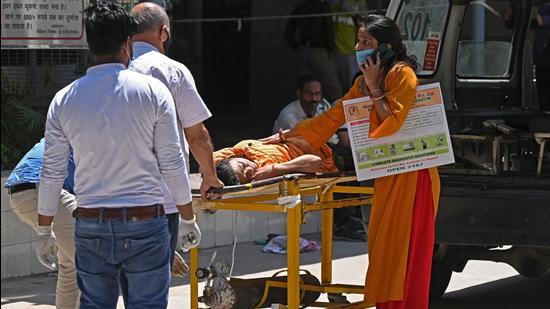It is time to revive MPLADS. It will help citizens
Restoring MPLADS will help pave the way for synergies between the political representative and the administration to augment basic health care in rural areas
In April 2020, the Members of Parliament Local Area Development Scheme (MPLADS) funds were suspended for two years, i.e., 2020-21 and 2021-22. Under MPLADS, every MP is entitled to an amount of ₹5 crore annually. The scheme aims to address local development demands and the needs of an area through priority developmental, infrastructural, and asset-building works.

The pandemic has hit India’s hinterland in the past few weeks, and the share of rural districts in Covid-19 cases and deaths is increasing every day. The “test-trace-treat” mantra is observed largely in the breach — with not enough testing, non-existent contact tracing, and the absence of medical infrastructure to offer treatment, thus leading to countless avoidable deaths. While appeals for help on social media platforms may have gone down, those suffering in rural India do not have the luxury to voice their distress and despair on online platforms. This makes it difficult to gauge the spread and damage of Covid-19 on rural lives and livelihoods. But there are now credible accounts of severe undercounting of both cases and deaths.
At a time when the second wave is still devastating lives, and experts predict a third wave, it is even more critical for the government to restore MPLADS besides adopting a model of genuine decentralised decision-making, needed for local and rural Covid-19 relief measures.
Suspending MPLADS has left parliamentarians bereft of an instrument in exercising their autonomy and foresight needed in alleviating the impact of the current pandemic. There is often a popular misconception about the funds — and it almost appears to some that this is akin to a personal fund that MPs only use for political patronage or personal benefit. But the truth is that the allocation and expenditure of MPLADS funds is only through a well-defined procedure, which involves close collaboration with local authorities.
Anticipating the second wave, MPs could have engaged in a consultative and participatory process with district administrations last year. As we know, district authorities, civil society organisations, local communities, political volunteers, and elected leaders, including Members of Legislative Assembly (MLAs) and MPs of the areas concerned understand the concerns at the grassroots best, factoring in the local contexts and the social milieu of an area.
Through timely MPLADS disbursement, elected representatives can recommend priority areas of work and local concerns to the district authorities, according to their understanding and feedback. In order to boost preparations for Covid-19, measures such as setting up makeshift hospitals, mobile medical vans, adequate testing mechanisms, critical infrastructure for storage and power needed for vaccination programmes at the panchayat levels, and timely awareness of Covid-19 symptoms could have been undertaken right from the time the first wave hit us, over and above the interventions in these areas by the district administrations.
While experts have said that there is no scientific basis to believe that any future wave will disproportionately affect children, the second wave has offered a clear lesson — don’t become complacent, and be prepared. This may require setting up more paediatric ICU wards at government hospitals; boosting necessary oxygen infrastructure; provision of essential medicines and holistic protective kits for ANMs, ASHAs, anganwadis workers, teachers; plugging the infrastructural deficit plaguing anganwadi bhawans, primary health centres, nutrition rehabilitation centres; creating Covid-19 care facilities for pregnant mothers, specially-abled children and adults and other marginalised segments; and spreading awareness on Covid-19 symptoms and appropriate behaviour in regional languages.
Restoring and utilising MPLADS funds for priority areas will help in addressing, partly, the resource crunch of the districts. It will also help pave the way for the much-needed collaborative synergies between the political representative and the administration on the ground to augment basic health care facilities in rural areas.
The present dispensation — as much as it may want to avoid this inconvenient truth — is facing an enormous trust deficit due to the gross mismanagement of the pandemic. Restoring MPLADS will not only address the human capital needs of rural societies at large — but also restore the faith and confidence of citizens in their elected leaders.
Manoj Kumar Jha is Member of Parliament, Rajya Sabha
The views expressed are personal





